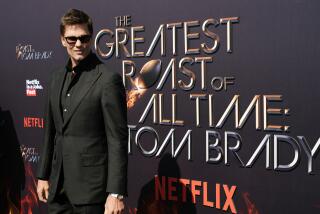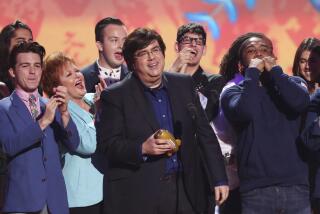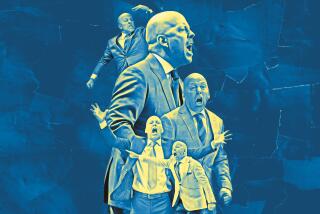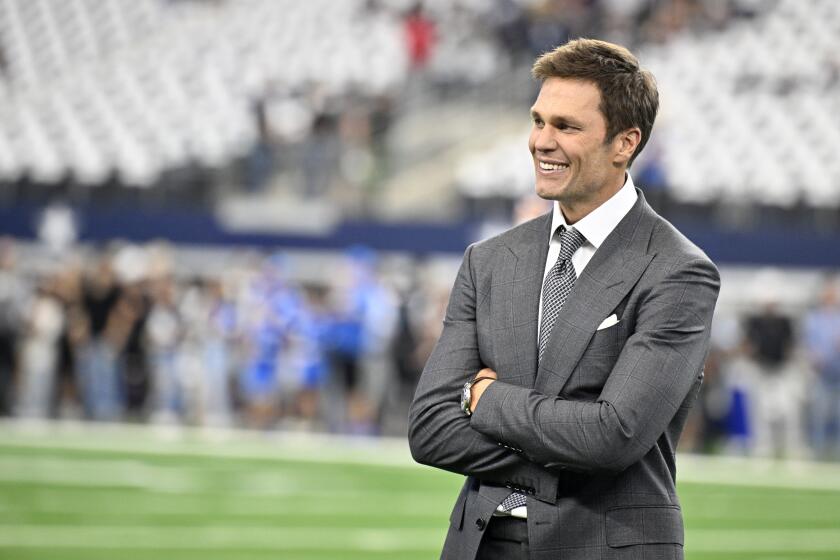Staying in the Pocket : Schroeder, Accustomed to Being a Target of Criticism, Doesn’t Take It Personally
As he emerged from lunch at the Raiders’ El Segundo training headquarters Wednesday, quarterback Jay Schroeder found himself facing a blitz.
A media blitz.
Cameras, cables, microphones, notebooks and a small army of reporters surrounded him, leaving Schroeder no time to call an audible.
His reaction? A smile.
“This is easy,” he said. “I stand for a living and have people run over me.”
Indeed, after facing an onrushing Lawrence Taylor or Karl Mecklenburg, the idea of holding off a few inquiring reporters can’t seem too terrifying.
But even that is not so easy for Schroeder these days. Mired in a slump that carried over from last season into last Sunday’s opening-day loss when he turned the ball over four times to the Denver Broncos, Schroeder has seemingly become Public Enemy No. 1 in Los Angeles, a city he called home long before he became a Raider.
To some, it seems, crime, pollution and overcrowding aren’t as big a civic menace as Schroeder.
He has been booed vociferously at the Coliseum. Newspapers carry stories speculating about his future.
He has been castigated on local sports-talk shows, by both the hosts and the callers. Bob from Torrance wants Schroeder on the bench. Fred from Encino wants him off the team. George from Arleta wants him out of the league.
So what’s it like living in the eye of such a vicious storm?
“It really doesn’t matter,” Schroeder said. “I have no idea what’s been said on the radio
and I don’t pick up the papers. I don’t know and I don’t care.
“It’s not the first time I’ve been a target and it won’t be the last time.”
Indeed, Schroeder has been going through this stuff in this town for a long time.
Here’s an idea of just how long: Commenting on a quarterback controversy, Schroeder’s coach said: “I don’t know who the starter is. I feel comfortable with either man as the quarterback.”
Was that Raider Coach Art Shell?
Nope, that was UCLA Coach Terry Donahue at the start of the 1980 season, when he was trying to choose a starter from between Schroeder and Tom Ramsey.
Ramsey won that battle, although Schroeder went on to throw the game-winning touchdown pass in the closing minutes against USC game season.
Schroeder appeared to have finally put the controversy behind him when he started every game for the Washington Redskins in 1986, threw 22 touchdown passes and made it to the Pro Bowl.
Schroeder led Washington to a 12-4 regular-season record and then to the NFC championship game before the Redskins lost to the eventual Super Bowl champion New York Giants.
“He looked like the next great quarterback,” said Vito Stellino, who covers the Redskins for the Baltimore Sun.
Instead, a year later, Washington was winning the Super Bowl and Schroeder, his nagging inconsistencies having resurfaced, was back on the bench, soon to be relegated to the No. 3 job behind Doug Williams and Mark Rypien.
That was where Raider owner Al Davis found him when he traded for Schroeder in 1988.
Since then, it has been an elevator ride, the touchdown passes inevitably followed, it seems, by the interceptions.
But never has Schroeder been as far down as he is now in terms of public acceptance. It has turned ugly and personal. If Schroeder were running for office, it would be time for a concession speech.
But that’s the last thing on his mind.
“This has nothing to do with what I do as a football player,” Schroeder said. “This is something that has been going on ever since I’ve been in the league. The media nowadays always wants to tear people down. It’s part of the game, but I can’t let it affect me personally.
“A lot of it has to do with faith. I’m not going to let what I do as a football player, good, bad or indifferent--and I’ve been all three--affect me throughout my life. I don’t want it to affect my kids or my family. That is the only way to deal with it.”
Although Schroeder avoids dealing with the personal attacks, he stands in the pocket and faces the criticism of his two interceptions and two fumbles Sunday head-on.
“I was the biggest mistake out there Sunday night,” he said. “You cannot turn the football over four times and expect to win the football game. There’s no secret about it.”
There has also been criticism of the Raiders’ offensive game plan, of their predictability, of their tendency to run on first and second downs, to stick too long with the bombs-away game, to use only two wide receivers in situations where other teams are going with three or four.
But Schroeder wouldn’t concede any problems in the offense.
“Nobody was questioning that when we were winning with it in 1990,” he said. “Nobody would be saying anything if we were executing (the plays properly).”
Schroeder says the execution will be there in the future.
“I believe in myself,” he said. “A whole lot of other people don’t, but I do. I know I can play this game and play it well.
“If you let (the criticism) affect you personally, you’d be in a mental institute somewhere. I’m not going to end up there. I guarantee you I’m not going to walk out of this a basket case.”
More to Read
Go beyond the scoreboard
Get the latest on L.A.'s teams in the daily Sports Report newsletter.
You may occasionally receive promotional content from the Los Angeles Times.










